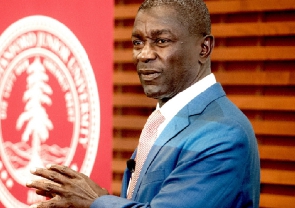Founder of the now-defunct UT Bank Prince Kofi Amoabeng was picked up at his office following a bench warrant for his arrest issued by the Accra Circuit Court.
The Bank of Ghana in August 2017 declared UT Bank and Capital Bank insolvent after it failed to meet the minimum capital requirement.
“Despite repeated agreements between the Bank of Ghana and UT Bank and Capital Bank to implement an action plan to address these significant shortfalls, the owners and managers of UT Bank and Capital Bank were unable to increase the capital of the banks to address the insolvency,” BoG statement said.
Prince Kofi Amoabeng, however, expressed surprise as to why the government of Ghana closed down UT Bank despite interventions by some UT investors to bail them out.
“If UT Bank owed 800 million and an investor comes and says I’m ready to pay half of it (400 million) and Bank of Ghana (BoG) writes off the 400 million but decides to close down the bank which will cost the nation at least 2.2 billion, it didn’t make sense,” he said on the ‘KSM Show.’
Meanwhile, 26 charges, including stealing of various sums in excess of GHS260 million have been pressed against the former CEO and founder of Capital Bank, William Ato Essien.
Read Read the full story originally published on December 14, 2020 on GhanaWeb
Prince Kofi Amoabeng, the founder of the now-defunct UT Bank, has been arrested over the collapse of the bank.
He is said to have been picked up at his office, Tuesday. This follows a bench warrant for his arrest issued by the Accra Circuit Court, Monday.
The businessman, according to reports, will soon be prepared for the Accra Circuit Court IV.
The Bank of Ghana on August 7, 2017, declared UT Bank and Capital Bank insolvent after it failed to meet the minimum capital requirement.
“Despite repeated agreements between the Bank of Ghana and UT Bank and Capital Bank to implement an action plan to address these significant shortfalls, the owners and managers of UT Bank and Capital Bank were unable to increase the capital of the banks to address the insolvency,” BoG statement said.
Already, former CEO and founder of Capital Bank, William Ato Essien is standing trial on 26 charges, including stealing of various sums in excess of GHS260 million.
Prince Kofi Amoabeng who is the president of UT Group of companies, recently said he still finds it very difficult in understanding why the government of Ghana closed down UT Bank despite interventions by some UT investors to bail them out.
“If UT Bank owed 800 million and an investor comes and says I’m ready to pay half of it (400 million) and Bank of Ghana (BoG) writes off the 400 million but decides to close down the bank which will cost the nation at least 2.2 billion, it didn’t make sense,” he said on the ‘KSM Show.’
The business mogul said it is easier to lose that 400 million than to incur a cost of about 2.2 billion on a country like Ghana, plus collateral damages, unpaid staff among others.
“It’s as if the government did not take their time to really evaluate the options they had but when people say that the action is to get to me, then it is really ridiculous because you can’t get me. If you target me, you target the wrong person,” he told his critics.
He reiterated that UT Bank as a listed company had about 15,000 shareholders whose investments were just disenfranchised because of the bank's closure and nothing has happened to them.
Amoabeng advised that as individuals "when things are going on very well, we have to ask ‘God why me’ but when things are not going on well, then we need to ask ‘God what’s next?’".
He said he always feels sad anytime he sees ex-staff of UT Bank selling along the road or indulged in menial jobs.
He further indicated that he was the last person to hear of the collapse of his bank even though a day before the collapse, he had spoken to the Finance Minister, Ken Ofori Atta, who never mentioned of the collapse until 8 am that he called his daughter.
Kofi Amoabeng has been put before an Accra Circuit Court for his role in the collapse of his bank.
He is facing charges of stealing and money laundering.
The court presided over by Justice Essandor, has granted Mr Amoabeng bail to the tune of GHS110 million cedis with two sureties who earn not less than GHS 2,000 after the prosecution said investigations were still ongoing.
General News of Thursday, 14 January 2021
Source: www.ghanaweb.com













